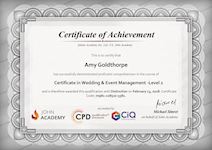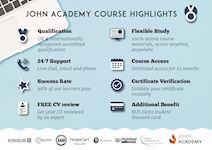Diploma in Customer Service: Telephone Etiquette
John Academy
Summary
Overview
Are you aware of the importance of communication etiques? Do you know that there specially made etiquette for customer telephone service? If you are curious and want to know how to improve yourself to be able to communicate well, then this course will help you with that!
When people noticed or realized that their communication skills specifically telephone etiquette is wrong or the do not possess such trait, they are often uncertain of where they should start to change it. In this course, you will know that one of the first steps to gaining or improving a person’s phone etiquette is to know the different aspects of it. You should know the basics like phrasing and listening skills. If not, this is your chance to correct it.
There are particular methodologies and techniques that may help you upgrading your relational abilities and these will disclose to you where you are deficient. In this course, you will clearly get individuals to react with the right communication and approaches to doing it effectively since lot of people do not realize they have little or no phone etiquette.
CPD
Course media
Description
Why choose us?
- Study in a user-friendly, advanced online learning platform;
- All the study materials are available in your student portal including videos tutorials.
- One of the most successful online education platforms in the UK.
- Affordable, engaging & high-quality e-learning study materials;
- You will have unlimited access to online learning platform in 24 hours a day, 7 days a week in 12 Months.
- Efficient exam systems for the assessment and instant result;
- The UK & internationally recognised accredited qualification;
- Access to course content on mobile, tablet or desktop from anywhere anytime;
- The benefit of applying for NUS Extra Discount Card;
- 24/7 student support.
- Technical supports and live chat service for your inquiries. This is very helpful for international learners.
- Excellent and flexible mentor supports by our team of experienced tutors/trainers via email.
Module One: Getting Started
Objectives
Module Two: Aspects of Phone Etiquette
Phrasing
Tone of Voice
Speaking Clearly
Listen to the Caller
Case Study
Module Three: Using Proper Phone Language
Please and Thank You
Do Not Use Slang
Avoid Using the Term “You”
Emphasize What You Can Do, Not What You Can’t
Case Study
Module Four: Eliminate Phone Distractions
Avoid Eating or Drinking
Minimize Multi-Tasking
Remove Office Distractions
Do Not Let Others Interrupt You
Case Study
Module Five: Inbound Calls
Avoid Long Greeting Messages
Introduce Yourself
Focus on Their Needs
Be Patient
Case Study
Module Six: Outbound Calls
Be Prepared
Identify Yourself and Your Company
Give Them the Reason for the Call
Keep Caller Information Private
Case Study
Module Seven: Handling Rude or Angry Callers
Stay Calm
Listen to Their Needs
Never Interrupt
Identify What You Can Do for Them
Case Study
Module Eight: Handling Interoffice Calls
Transferring Calls
Placing Callers on Hold
Taking Messages
End the Conversation
Case Study
Module Nine: Handling Voicemail Messages
Ensure the Voicemail Has a Proper Greeting
Answer Important Messages Right Away
Ensure Messages are Delivered to the Right Person
When Leaving a Message for Others
Case Study
Module Ten: Methods of Training Employees
Group Training
One-on-One Training
Peer Training
Job Shadowing
Case Study
Module Eleven: Correcting Poor Telephone Etiquette
Screening Calls
Employee Evaluations
Peer Monitoring
Customer Surveys
Case Study
Module Twelve: Wrapping Up
Words from the Wise
Review of Parking Lot
John Academy: A Great Place to Learn for Everyone, Forever
Expert Authors: We select authors with expertise and experience of training professionals. Our authors are industry experts, academics, authors, face-to-face trainers or online trainers; most often they have a combination of these backgrounds
Engaging Content: Our succinct, bite-sized and business-focussed course materials are designed to deliver the most effective training for you. Each course is made up of modules, manageable learning chunks of text, images, videos and tasks.
Assessment and Certification:
Upon completion of the course, you will be required to sit an online multiple-choice test. Your test will be assessed automatically and the results will be given to you immediately. Before sitting your final exam you will have the opportunity to test your proficiency with a mock exam. After you have successfully passed the final exam, you will be able to order an Accredited Certificate of Achievement at an additional cost of £24 for a PDF copy and £39 for an original print copy sent to you by post.
Who is this course for?
- Professionals who work in the communications industry or part of the communications department. This will also be helpful to those people who are struggling with communication and expressing their thoughts into actions.
- People who are interested in learning more about communication.
Requirements
- This course is available to all learners, of all academic backgrounds.
- Learners should be aged 16 or over to undertake the qualification.
- Good understanding of English language, numeracy and ICT are required to attend this course.
Career path
The Diploma in Customer Service: Telephone Etiquette is a useful qualification to possess, and would be beneficial for the following careers:
- Call Centre Agent
- Concierge
- Client Relations Associate
- Customer Service Representative
- Front Desk Associate/Receptionist
- Member Service Specialist
- Patient Care Coordinator.
Questions and answers
Currently there are no Q&As for this course. Be the first to ask a question.
Reviews
Currently there are no reviews for this course. Be the first to leave a review.
Legal information
This course is advertised on reed.co.uk by the Course Provider, whose terms and conditions apply. Purchases are made directly from the Course Provider, and as such, content and materials are supplied by the Course Provider directly. Reed is acting as agent and not reseller in relation to this course. Reed's only responsibility is to facilitate your payment for the course. It is your responsibility to review and agree to the Course Provider's terms and conditions and satisfy yourself as to the suitability of the course you intend to purchase. Reed will not have any responsibility for the content of the course and/or associated materials.




